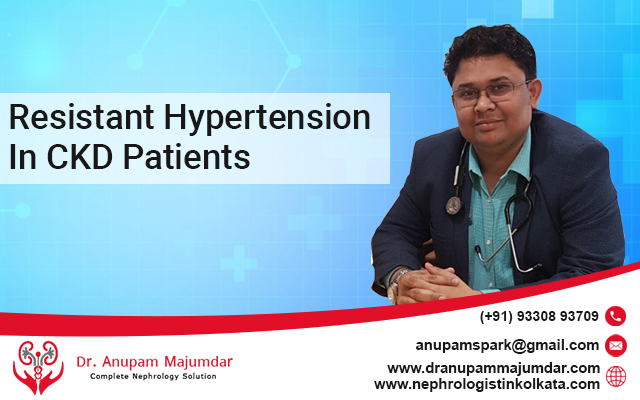The force with which blood pushes against the artery walls is the blood pressure. Every heartbeat generates this force as the heart pumps blood into the blood vessels. If the average arterial blood pressure is 130/60 mmHg or more, it is hypertension. It ultimately makes it difficult for the heart to pump blood through the body because it damages the large arteries as well as the small ones. When high blood pressure does not properly respond to medical treatment, it is known as resistant hypertension. This condition is deadly for patients suffering from chronic kidney disease (CKD). Here we will mention a few points regarding this matter, which we learnt from a kidney specialist doctor in Agartala.
- The most frequent patient comorbidity associated with resistant hypertension is chronic kidney disease. In CKD patients, the presence of resistant hypertension is more common.
- Apart from triple antihypertensive drug treatments including a diuretic and a low-salt diet, the sequential addition of other antihypertensive drugs is essential for patients with resistant hypertension.
- Poor response to drugs is often the result of inadequate control of blood pressure. Among the various causes of apparent treatment-resistant hypertension, this is a major one.
- There can be non-adherence by the patients due to increasing drug-related side effects, which is a result of complex multidrug therapeutic regimens. The best way to manage the condition is to reduce the number of medicines and encourage the use of blood pressure monitoring and consultation with doctors.
- A kidney specialist in Agartala plays an important role in managing resistant hypertension in patients with chronic kidney disease (CKD). This is possible through prescribing diuretics, not increasing the doses of blood pressure medications and managing salt restrictions in diet.
- Renal denervation and carotid barostimulation are new therapeutic innovations for resistant hypertension. These are coming into use to manage the condition in patients with advanced chronic kidney disease (CKD).
- There should be some effective policies taken by the health officers. These include earlier diagnosis of resistant hypertension in chronic kidney disease (CKD) patients, overcoming therapeutic inertia, reduction of salt content in food and prescribing effective medicines.
Diagnosis and Treatment
The doctor carries out a complete physical exam in CKD patients to check for resistant hypertension. He/she also asks questions about the medicines a patient is taking at that time and the dosages of those medicines. The doctor checks the blood pressure of the patients and recommends making arrangements for the measurement of blood pressure at home. 24-hour ambulatory blood pressure monitoring may be necessary.
As per the opinion of a kidney specialist doctor in Kolkata, the treatment may involve certain medications. There can be the use of some device-based therapies, which include:
- Arteriovenous coupling, which is placing a stunt in between the iliac artery and the iliac vein.
- Catheter ablation of sympathetic nerve endings in the renal artery.
However, the use of device-based therapies depends entirely on the doctor’s decision.

